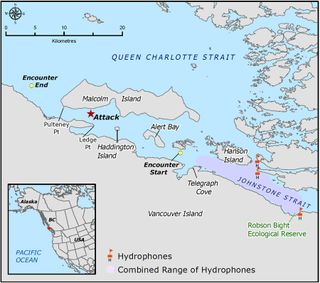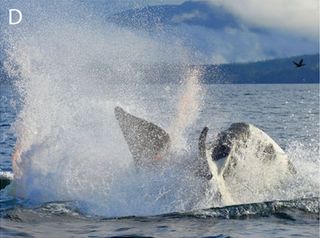Whale Murder Was Sexually Motivated, Whale Detectives Say
Scientists have accused a killer whale of murder — and its 46-year-old mother is an accomplice.
Following a violent whale-on-whale clash near Vancouver Island near western Canada, a male orca and his mother were observed capturing another whale's newborn calf by the tail, abducting it for nearly 3 hours and ultimately drowning it deep underwater.
The marine biologists who witnessed the attack called it "the first account of infanticide reported in killer whales" and "the only case committed jointly by an adult male and his mother" outside of humans.
In a new paper that reads like a police report (published March 20 in the journal Scientific Reports), the researchers described the grisly incident — and why they think it may have occurred. [Top 10 Deadliest Animals]
The facts of the crime
Early one December morning, marine biologists at a research station called OrcaLab caught wind of the unfolding attack when they picked up some strange whale calls on an underwater microphone. A squad of three scientists went to investigate.
When the researchers arrived at the source of the distressed calls, it was clear an altercation had occurred. They saw a trio of whales (ages 2, 3 and 13 years old) hauling fin at close to 10 mph (17 km/h) toward a nearby group of their family members. One of the younger whales was wounded, bleeding from a bite wound on its left flank and pocked with fresh teeth marks around its body. The trio was seemingly being chased by an adult male orca (about 32 years old) and its mother (about 46 years old).

The fleeing three whales soon rejoined the rest of their family, which included the group's mother (age 28) and several other children, including a little white newborn (or "neonate"). The family began swimming westward together. Soon, though, the aggressively pursuing male and its mother caught up to them.
Sign up for the Live Science daily newsletter now
Get the world’s most fascinating discoveries delivered straight to your inbox.
"Erratic movements and splashing suggestive of a predation event were observed," the researchers wrote. The scuffling whales darted in and out of the sea, splashing sprays of water and blood. After a few minutes, it became clear that the newborn calf had not surfaced with its mother.
Soon, the researchers saw the adult male attacker swim by — with the baby whale hanging out of its mouth. "The fluke of the neonate could be seen in his mouth with the body intact trailing underneath his lower jaw," the researchers wrote.
The mother whale chased after the male attacker, who was now bleeding from fresh bite wounds. At one point, the aggressor male's mother joined the fray by throwing her body in front of the newborn's mom, impeding her pursuit.
All told, the male attacker and his mother kept the captured newborn in their possession for more than 3 hours — finally diving with it deep underwater and drowning it.
Why kill a baby whale?
Infanticidal acts are rarely observed in nature, the researchers wrote, but primates, carnivores, rodents and dolphins have all been caught in the act from time to time.

Scientists don't fully understand the motives behind animal infanticide, but one prominent theory is that males kill off a female's offspring in order to stop her from lactating, making her eligible to mate again more quickly — in other words, the crimes may be sexually motivated.
"In these cases, infanticide not only creates a mating opportunity but can also remove the progeny of a competing male from the gene pool," the researchers wrote.
That hypothesis could explain the adult male whale's motives in this case, but why get its mom involved? According to the OrcaLab researchers, it's not uncommon to see an adult male orca traveling continuously with its mother and cooperating in predation, especially if the mom is beyond reproductive age.
"Post-reproductive female killer whales increase the survival of adult sons by sharing ecological knowledge and prey with them," the researchers wrote. A mother whale might also try to help its son mate, thus ensuring that the mother's lineage continues, the researchers added.
Additional details in this killer whale killing — including the slain newborn's paternal lineage — remain under investigation.
Originally published on Live Science.

Brandon is the space/physics editor at Live Science. His writing has appeared in The Washington Post, Reader's Digest, CBS.com, the Richard Dawkins Foundation website and other outlets. He holds a bachelor's degree in creative writing from the University of Arizona, with minors in journalism and media arts. He enjoys writing most about space, geoscience and the mysteries of the universe.
Most Popular


